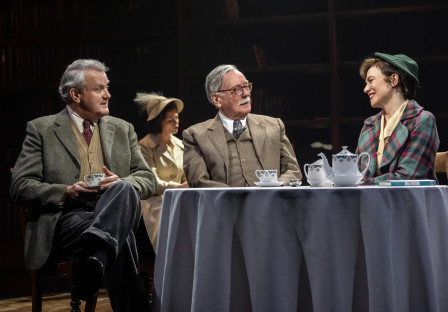Review: 1536 at Almeida
The Almeida has never shied from presenting challenging, revisionist work. In Ava Picket’s 1536 the strongly female-centric Tudor tale, packs a punchy modern parallel.
 Siena Kelly, Tanya Reynolds and Liv Hill in 1536 at the Almeida Theatre. Credit Helen Murray.
Siena Kelly, Tanya Reynolds and Liv Hill in 1536 at the Almeida Theatre. Credit Helen Murray.
Three young women, friends who have grown up together in the same village not far from Colchester, endure a life where the only excitement is the sporadic, two or three days old news drifting up from London, detailing King Henry VIII’s troubles with his Queen, Anne Boleyn. The play is an exploration of what women want, or in some instances, what they think they deserve. More specifically, how the little to which they are entitled, is entirely at the behest and in the power of men to grant.
The stage (as designed by Max Jones) is bedecked in clumps of drying long grass and teazles and dominated by the trunk remnants of a tree long ago struck by lightning. Copulating up against it, as the lights go up, are Anna (Siena Kelly) and Richard (Adam Hugill). She has beauty, is sexually confident and flirtatious. He, we learn after several of these episodes, is equally enamoured but has no intentions of making her his wife and has been betrothed courtesy of his landowner father, to the respectful and more submissive Jane (Liv Hill) who will serve as good breeding stock. Completing the trinity of women is Mariella (Tanya Reynolds) who is learning the craft of midwifery having lost any chance of being married to William (Angus Cooper) due to her lack of dowry.
As Richard’s marriage draws ever closer, Anna’s realisation that she is unlikely to find a match due to rumours that she has been fornicating with married or betrothed men, leads to fears of powerlessness and genuine concern for her future, especially as news has begun circulating of women in a nearby hamlet being burned for similar offences. Lyndsey Turner’s direction, rightly focuses on the three women’s broad spectrum of acceptance and adherence to social mores, and particularly in the shadow of The King’s recent treatment of his once beloved Anne, which sets the national tone for keeping the weaker sex subjugated and in fear.
The production demonstrates the strong and caring bonds which women can form, whilst not shying away from the catastrophic divisions which can erupt when a man is introduced into the mix. Each of the female protagonists is given opportunities to demonstrate sensitivity, yearning, fury and frustration at the powerlessness required of them by society and sometimes by each other. There are gentle moments of desperate heartbreak, interludes of bawdy hilarity and a naturalistic style redolent of anything you could witness in a modern drama. This Tudor tale is as far from a corseted costume drama, as you are likely to find.
Plays at The Almeida until 7th June.
Latest News

 Review: SHADOWLANDS at Aldwych Theatre
14 February 2026 at 18:17
Review: SHADOWLANDS at Aldwych Theatre
14 February 2026 at 18:17

 Review: I'M SORRY, PRIME MINISTER at Apollo Theatre
13 February 2026 at 14:55
Review: I'M SORRY, PRIME MINISTER at Apollo Theatre
13 February 2026 at 14:55

 Review: THE UNLIKELY PILGRIMAGE OF HAROLD FRY at Theatre Royal Haymarket
13 February 2026 at 13:18
Review: THE UNLIKELY PILGRIMAGE OF HAROLD FRY at Theatre Royal Haymarket
13 February 2026 at 13:18

 Review Round-Up: I'M SORRY PRIME MINISTER at the Apollo Theatre
13 February 2026 at 12:54
Review Round-Up: I'M SORRY PRIME MINISTER at the Apollo Theatre
13 February 2026 at 12:54